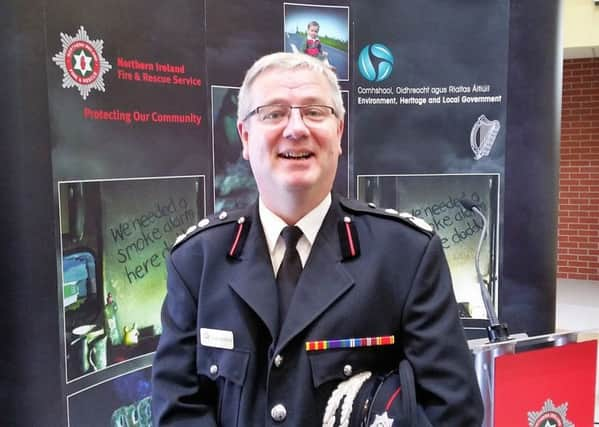'˜Firefighters at Grenfell had a horrendous task'


Watching the horrific events unfold on television, Dale Ashford said: “I have been at lots of fires in high rise buildings but when I first saw the images from Grenfell I could tell it was exceptional and different from the norm.
“Usually in high rises you fight from the inside and it is relatively easy to contain it on the floor. You set up a bridge two floors below and work up to the fire. But when I saw the images I saw this was out of the norm. To have a fire in the whole of the building like that is something I have never seen before.’’
Advertisement
Hide AdAdvertisement
Hide AdHis experience of tackling large-scale fires told him it was going to be a massive task, but he added: “I know the Fire Chief of London (Dany Cotton), I have met her a few times, and she is very, very capable.
“I knew it was going to get dealt with professionally, by a very dedicated team of firefighters but I could tell it was going to be a huge challenge.’’
But he added that being at the forefront of the disaster would have been a very daunting experience for firefighters.
‘‘It would have been a difficult place to be. You are concerned with your own safety but the overwhelming urge is to do everything you can to rescue the people in the premises if it is possible to do that.
Advertisement
Hide AdAdvertisement
Hide Ad“If there is a life to save at all you want is to go in an do what you can. I can appreciate how difficult it would be and it would have been horrendous for them.’’
In the aftermath of the harrowing incident, he said firefighters would have to deal with their own emotional trauma, but said the service is well-equipped to deal with these issues.
“The modern Fire Service takes a very sensible approach to the impact of a situation like this on firefighters. When I first joined you were told to just not talk about it or ask for help but now there are systems in place.
“They will have critical incident debriefs, asking if everyone is OK and how they feel. There will be specially trained experts to look for signs that someone isn’t coping or needs extra help and they are encouraged to have conversations with people. It isn’t a sign of weakness or something that they should be ashamed of.’’
Advertisement
Hide AdAdvertisement
Hide AdHe added: “Over a career in the Fire Service everyone sees some horrific stuff. Everyone is different and what annoys me may not annoy the next bloke but PTSD (Post Traumatic Stress Disorder) is a very real phenomenon and it is something we recognise the impact of so we try to do everything we can to make sure the firefighters get the help they need. I am sure the London Fire Chief will have measures in place to make sure her staff are going to be OK.”
Despite the variety of roles he has held in the Fire Service, Dale was always ready, willing and able to tackle a fire if he was called out, and until the day he retired his kit was always packed in the back of his car.
Working as head of Health and Safety for the Fire Service brought its own set of challenges. “Doing risk assessment for someone who runs into a burning building is a different world,” said Dale.
“You are working in an environment that is completely not safe and you have to risk people’s lives. We have such well thought out procedures and policies.
Advertisement
Hide AdAdvertisement
Hide Ad“We tell our staff - we want you to risk your lives to save other people’s lives, to an extent we want you to risk your lives to save their property but to a lesser extent. But we don’t want you to risk your lives at all for lives and property that are already lost. There’s a natural tendency in the Fire Service that people will risk their lives to help others but we need to channel that in the proper way, They can’t risk their lives for something that is already lost. I never met a firefighter that wouldn’t risk their lives, and long may that continue.”
In 2012, Dale became assistant chief fire officer and for him one of the most challenging undertakings during his time in post was the organisation of the World Police and Fire Games, which saw thousands of police officers and fire fighters flock to Belfast from all over the world for the competition.
“The games are held every two years, mainly in America, and this was the first time it came to Northern Ireland and only the second time in Europe. At the start there was doubt that anyone would travel to Belfast but they came in their droves. I really loved it.”
In 2015 both the fire chief and the chief executive retired from the Fire Service within weeks of each other and Dale was asked to merge the two jobs into one and he became the interim fire chief for Northern Ireland, “It was a bit daunting and I wondered if I was up to it,” Dale confessed. “It was a huge responsibility. There’s 2,000 employees and a £40 million budget. You have responsibilty for everything.”
With retirement plans on his mind, Dale decided to step back to being assistant chief for the reminder of his time with the service.